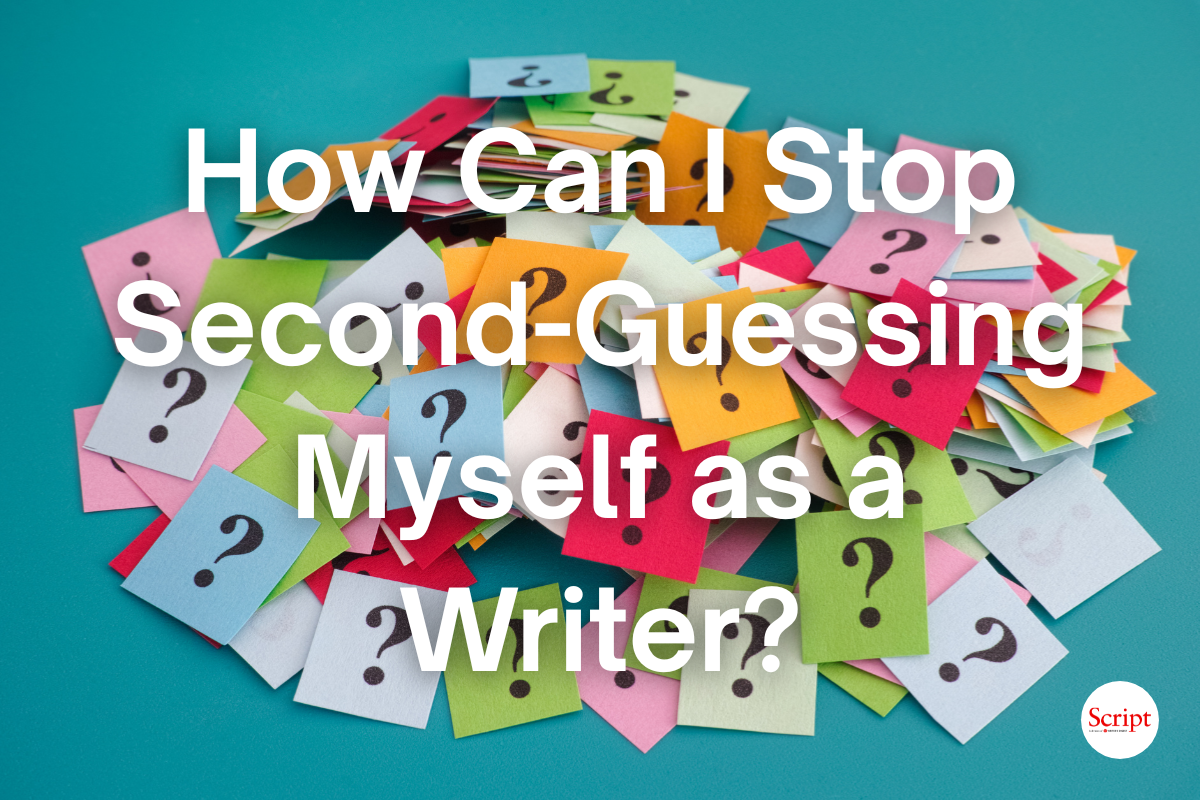How Can I Keep Up My Confidence In Myself as a Writer?
Keeping up your confidence means writing regularly and consistently.
Welcome to the next installment of “Ask the Coach.” As a writing coach, I answer questions from writers about making the work of writing happen, tackling craft, business, and personal questions along the way. (Have a question you’d like answered? Check the details at the end of the article about how to submit one.)
Today I’m responding to a question about how to keep up confidence with writing:
“My biggest challenge is making regular time to write and work on a script. My question is about keeping my confidence up that I can do this.”
Although at first glance your question focuses only on confidence, you’ve linked two important pieces of the same writing puzzle: making time to write, and having confidence in yourself to keep going.
You’ve also put your finger on a key point: Many writers struggle to “find” time to write, without realizing they actually need to make time to write. It’s a subtle but important distinction. Writing doesn’t happen accidentally when we miraculously manifest a spare hour (though of course, we’ll happily accept that hour if it appears). Writing happens when we create a structure and routine around our writing so we can show up regularly to work.
But what happens to our writing routine if we’re also struggling with confidence? Even if we’ve made time to write, if we’re doubting ourselves, it’s hard to show up and do the work. Procrastination, paralysis, and resistance flourish in any gaps in our writing practice, and in any doubts we however secretly harbor.
In my experience, confidence can ebb and flow for writers. Sure, there are writers out there in the world who appear to be supremely and constantly confident. I suspect, though, that there are more of us wrestling with self-doubt than those who are not.
Here’s what I know about confidence and writing.
Being confident means feeling self-assured, believing in yourself and your abilities, and trusting that you can rely on yourself. When it comes to writing, this can mean many different things: Being confident in your writing practice, your writing and storytelling abilities, your marketing and networking skills, your personal self-mastery, and more. We all have the ability to build confidence in each of these areas over time. We also all have the possibility that our confidence in each of these areas can be shaken at any time by challenging experiences.
Confidence is built through experience and taking action. When you take creative risks, however small, and build on your successes, you gradually learn where and how you can trust yourself. When you pay attention to your results along the way — both externally and internally — you can study what works for you and what doesn’t, and build from there. In other words, you build confidence over time and through experience — and rebuild it when needed.
Protect your confidence by making smart choices about who you interact with and with whom you share your work. I’ve seen negative or unkindly delivered feedback shake many writers to the core (including yours truly). Feedback can be incredibly valuable, so this doesn’t mean you should hide or avoid getting feedback, but it does mean choosing who you share your work with wisely. You can also work on how you take in or filter less-than-thoughtful or downright inappropriate feedback from others.
How you talk to yourself really matters. Writers are creative beings. Our internal critics can be quite cruel with insults and negativity, all designed to keep us “safe” from taking creative risks (ironically, often those very risks we need to take to build confidence). The inner conversations we have with ourselves can therefore be confidence building, or confidence breaking.
You get to decide what story you tell yourself about each step of the writing journey you take.
“Wow, he must think I’m a terrible writer. I don’t know if I’ll ever get anywhere doing this,” could instead become, “I really hung in there even he said those negative things about my story and I’ve learned so much from that experience both about what I want to do with it and whether I want to work with him again.”
Taking consistent, regular action to write builds confidence. Honoring and meeting your commitment to writing builds your sense of self-trust, self-esteem, self-confidence, honor, and personal integrity. You’re doing what you said you were going to do. Every day you write, you’re earning your belief in yourself. You can trust yourself. If you’ve fallen off the writing wagon, that’s OK. Start today, by writing just a little. Then do it again tomorrow. Build your writing practice back up gradually until you’re where you want to be again.
Starting and finishing scripts makes a big difference. If you jump from project to project, it’s hard to see and measure progress. Seeing a script build from start to finish helps you — again — trust yourself and build confidence. Having a body of work to point to helps combat self-doubt when it creeps in. “I’ve written four solid scripts I feel great about” is so much more reassuring than having 15 unfinished projects nagging at you.
Facing and solving tough story challenges teaches you that your storytelling skills are improving. Plot issues, difficult scenes, character arc problems, mundane dialogue — you can see these as personal failures, or you can see them for what they are: opportunities to learn and grow as a writer. Each time you tackle a story problem head-on and solve it adds another boost of confidence to your growing skill set.
How you approach these challenges makes a difference, too. Is it an insurmountable obstacle you need help to face? Or a creative challenge to brainstorm and solve? Believing (or telling yourself) “I can do this” goes a long way toward finding solutions. And when you solve it? Confidence is the reward. Stick with it, stay the course, do the work. It’s worth it.
The evidence you take in matters. If you tell yourself you lack confidence, skill, or ability, you will subconsciously look for evidence to match. Even if you’re new to writing, you can lean into the skills from the rest of your life, and see how they translate to your writing. Did you use to run a successful business? Great! You’ll have excellent communication skills for dealing with marketing and collaborating.
Choosing to believe in yourself ultimately comes first — it’s a choice. Confidence is a choice you make about yourself. And I’m not talking about self-aggrandizement, arrogance, or grandiosity. No, this is about day-to-day, constitutional confidence: believing in your value and self-worth because you are YOU. Writing is something you do. It may be part of your external identity, but it isn’t who you are at your core. You are a radiant human being here to share your unique perspective on the world. And we’re here for it.
That’s a Wrap
Keeping up your confidence means writing regularly and consistently, striving to talk to yourself in a supportive and generative way, creating opportunities to believe in yourself and your work, and looking for evidence to support those beliefs. It’s an ongoing project, much like writing, exercise, or meditation. And just like with a writing practice, when you keep engaging in it regularly, you’re better able to enjoy its rewards.
Thank you for asking your question, and happy writing!
Screenwriters, what challenges do you run into that you'd love to see us address in our articles? Take our short survey here.
Submit your question to be answered anonymously via my online form here or email directly to askthecoach@calledtowrite.com. Look for answers to selected questions in my monthly “Ask the Coach” column on the third Thursday of the month. And reach out to me on Twitter to share your thoughts: @JennaAvery.







